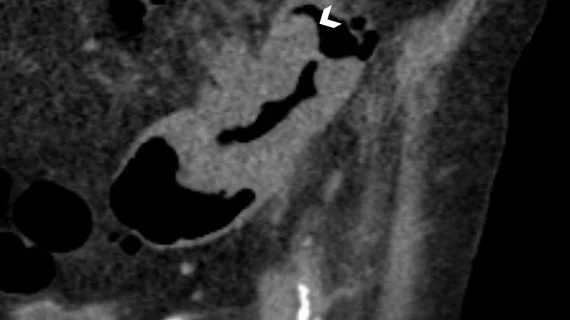CT colonography utilization has doubled over the last decade
Utilization of computed tomography colonography (CTC) for colorectal cancer screening has seen significant growth in recent years.
The amount of people opting for CTC screening in lieu of colonoscopy more than doubled between 2019 and 2021, according to new data published in Clinical Imaging. And that number is expected to grow even more in the coming years, as the exam serves as a noninvasive alternative to colonoscopy, while also providing more accurate results than less invasive stool tests.
“Compared to colonoscopy, CTC is associated with lower risks of complications such as bleeding or perforation and eliminates the need for sedation," corresponding author Po-Hong Liu, MD, from the Division of Digestive and Liver Diseases at University of Texas Southwestern Medical Center, and colleagues explained.
“Compared to annual stool-based tests, CTC is more effective at identifying advanced neoplasia," the group continued.
Researchers analyzed CTC utilization data from 58,058 adults included in the National Health Interview Survey during the years 2010, 2015, 2018, 2019 and 2021. In addition to examining the overall frequency of the exam, the team also looked at how different sociodemographic and health factors influenced the decision to opt for CTC.
Between 2010 and 2019, CTC accounted for 0.8% to 1.4% of all colorectal cancer screenings in the group. By 2021, this figure increased to 3.5%.
Hispanic and non-Hispanic Black adults were among those most likely to opt for CTC screening, as were those who had lower household incomes (200%-400% of the federal poverty level). Hispanic adults and families with lower household incomes are historically less likely to undergo colorectal cancer screening, while the non-Hispanic Black population has the highest rate of the disease in the United States, the group explained, adding that the higher rates of CTC us among these demographics could present an opportunity to increase screening adherence.
“Our results suggest that CTC could serve as an effective approach to increase [colorectal cancer] screening uptake especially among at-risk populations and reduce disparities, as we observed higher CTC utilization among populations who are traditionally less likely to complete [colorectal cancer] screening and disproportionately experience higher CRC burden,” the authors wrote.
Health conditions were also a factor, with diabetes, chronic obstructive pulmonary disease, cancer and recent hospitalizations (within 12 months of their screening) all being associated with increased use of CTC. This could be attributed to the potential for complications during colonoscopy, as some may have contraindications, difficulty with sedation or some other factor that make the procedure riskier.
Notably, CTC increased during the onset of the COVID-19 pandemic. This could be an after effect of many of the mitigation tactics deployed during that time, which could have fueled interest in the exam among patients requiring colorectal cancer screening who might have otherwise had to wait for a colonoscopy.
The group suggested that greater awareness of CTC could increase screening compliance, especially among those most vulnerable to the disease or who may have difficulty obtaining a colonoscopy.
Something else that could affect CTC uptake is payment for the exam. Although some private insurers cover CTC, coverage is not yet mandated. However, earlier in July the Centers for Medicare & Medicaid Services proposed paying for CT-based colon cancer screening. If enacted, the rule would go into effect in 2025.

